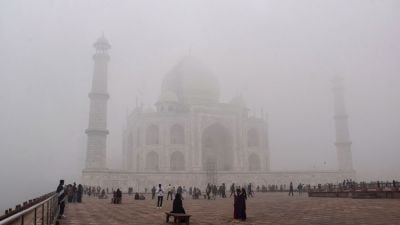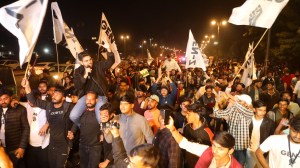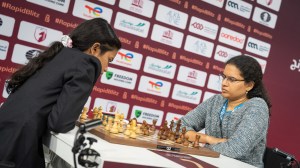Dr Singh in Islamabad?
As Pakistan8217;s leaders grapple with the difficult task of forming a new government, India has signalled its intent to resume the peace process...

As Pakistan8217;s leaders grapple with the difficult task of forming a new government, India has signalled its intent to resume the peace process at the earliest possible opportunity. New Delhi8217;s low-key welcome to the impressive assertion of popular will in Pakistan masks India8217;s high stakes in stabilising the current positive phase in bilateral relations.
India-Pakistan ties over the last four years have seen more advances than in the previous four decades. Guns are silent all along the international border, the line of control in Jammu and Kashmir, and the actual ground position line in the Siachen glaciers since the end of 2003. Bilateral trade is rapidly expanding, many border crossings are open, and people to people contact has flourished. Infiltration levels across the LoC are said to at their lowest levels.
Above all, there have been intensive negotiations on settling the question of Jammu and Kashmir. All indications are that these talks 8212; the first in four decades 8212; have produced credible framework for a final settlement. Since March 2007, when the political crisis in Pakistan began to unfold, the UPA government had no option but to wait for the dust to settle in Islamabad.
It is no secret that Prime Minister Manmohan Singh and President Pervez Musharraf have directly supervised a highly sensitive back channel negotiation on resolving the Kashmir question since mid-2005. Four big ideas have guided these talks.
These are: no change in the Indo-Pak territorial disposition in Jammu and Kashmir; softening the line of control; substantive devolution of powers from New Delhi and Islamabad; and finally, a consultative mechanism that will promote cooperation between the different regions of Kashmir.
But has the big moment for clinching a historic agreement with Pakistan on Jammu and Kashmir passed? India8217;s negotiations were with President Musharraf, whose standing in Pakistan has diminished significantly after the elections.
If the draft agreement on Kashmir falls into the dustbin, amidst the unfolding regime change in Pakistan, it would fit very neatly into the tragic pattern of bilateral relations. So very often the two leaderships have embarked on grand negotiations only to find themselves trumped by fate. Bold initiatives between Indira Gandhi with Zia-ul-Haq in 1984, Rajiv Gandhi and Benazir Bhutto during 1988-89, Atal Bihari Vajpyaee and Musharraf in 2004, all remained inconclusive.
Prime Minister Singh was eager to continue from where Vajpayee had to stop. His New Delhi meeting with Musharraf in April 2005 had produced the initial conceptual breakthrough on a J038;K settlement. Special envoys from both sides had since then worked on drafting an agreement on Kashmir.
Had Dr Singh chosen to override the sceptics in his own cabinet and government to visit Pakistan in either 2005 or 2006, the bilateral relationship might have advanced more decisively. By the time he was ready to travel to Pakistan in March 2007, it was too late.
As a new political dispensation emerges in Pakistan 8212; there are many unresolved issues, including the future of Musharraf8217;s presidency and the restoration of ousted judges 8212; India has many reasons to be optimistic about the negotiations on Kashmir and the normalisation of bilateral relations.
For one, New Delhi8217;s diplomatic discipline in keeping its nose out of our western neighbour8217;s internal turbulence has prevented India from becoming an issue in the deeply divisive internal debates in Pakistan.
India did not fish in Pakistan8217;s troubled waters when the army headquarters in Rawalpindi had to turn its attention to fighting Islamic militancy on its western frontiers. These two Indian moves offered political reassurance to Pakistan at one of its more difficult moments.
Whatever might be the composition of the new political regime in Pakistan, India has reasonably good equities with all the major political formations there. Musharraf8217;s successor as army chief, General Ashfaq Kayani, was an active party to the Indo-Pak negotiations on Kashmir in his previous capacity as the chief of the all-powerful Inter-Services Intelligence.
Even as it dealt with Musharraf, India had maintained contact with the opposition leaders, Benazir Bhutto and Nawaz Sharif, during their difficult days in exile. Bhutto, before her assassination in December, and her husband Asif Zardari, who has taken charge of the People8217;s Party since then, have had nothing but a positive attitude towards the peace process with India.
Sharif, who had launched major negotiations with Vajpayee on Kashmir, has often grumbled against India8217;s engagement with Musharraf, who had ousted him in the 1999 coup. Sharif insisted that India8217;s final settlement on Kashmir must be with the elected leaders of Pakistan, and not a military dictator.
Musharraf at his peak in 2005 did represent a moment of opportunity for the UPA government to get an agreement on Kashmir and make it stick. But a Kashmir settlement with a civilian government with a fresh popular mandate should, in theory, be even better. In practice, this depends upon the stability of the new dispensation in Pakistan.
India8217;s past experience with Pakistan8217;s civilian governments does not inspire much confidence. After the last few months of turbulence in Pakistan, and the changes wrought by Monday8217;s general elections, the past can no longer be a guide to New Delhi8217;s future relations with Islamabad.
India must necessarily keep an open mind on the unfolding structural changes in Pakistan; it must also be ready to undertake some risks in redefining relations with our most important neighbour.
While his diplomatic advisors assess the credibility of Pakistan8217;s new government and get a measure of its approach to the Kashmir negotiations, it is up to Manmohan Singh to underline India8217;s political will to move forward at whatever pace Islamabad might be comfortable with. One way of doing it is to fast-track the PM8217;s long delayed visit to Pakistan.
The writer is a professor at the S. Rajaratnam School of International Studies, Nanyang Technological University, Singapore iscrmohanntu.edu.sg
- 01
- 02
- 03
- 04
- 05































